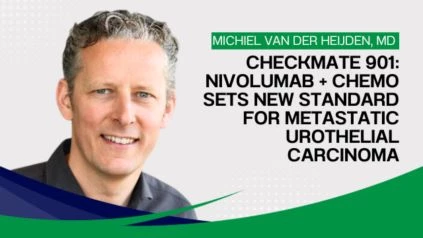Author: Dr Michiel van der Heijden (on-camera comments) – Courtesy of ESMO.org
Checkmate 901, a study focusing on first-line treatment for metastatic or irresectable urothelial cancer patients, aimed to improve existing chemotherapy approaches. Traditionally, chemotherapy, primarily cisplatin or gemcitabine, has been the standard for such cases. With the recent introduction of immunotherapy, there has been a challenge as many patients were unable to transition to immunotherapy post-chemotherapy.
Involving around 600 patients, the study randomized participants into two groups: one receiving the standard cisplatin-gemcitabine and the other receiving this combination along with nivolumab, a checkpoint inhibitor. The trial successfully met its primary endpoints: showing enhanced overall survival and progression-free survival for the nivolumab plus Gemsys group, indicating a statistically significant improvement.
Notably, the study witnessed an increase in complete remissions, which were more prolonged in duration for patients receiving the combination therapy. This finding suggests a quicker, more profound, and enduring response to the treatment, resulting in long-term benefits.
The treatment was generally well-tolerated, consistent with expectations for chemotherapy and checkpoint inhibitors, with no new safety concerns identified.
The results indicate that starting with immunotherapy in conjunction with standard GEM CIS from the outset brings about considerable benefits in overall survival and progression-free survival. Hence, following regulatory approval, this approach could potentially become a new standard of care for patients dealing with metastatic urological cancer.

